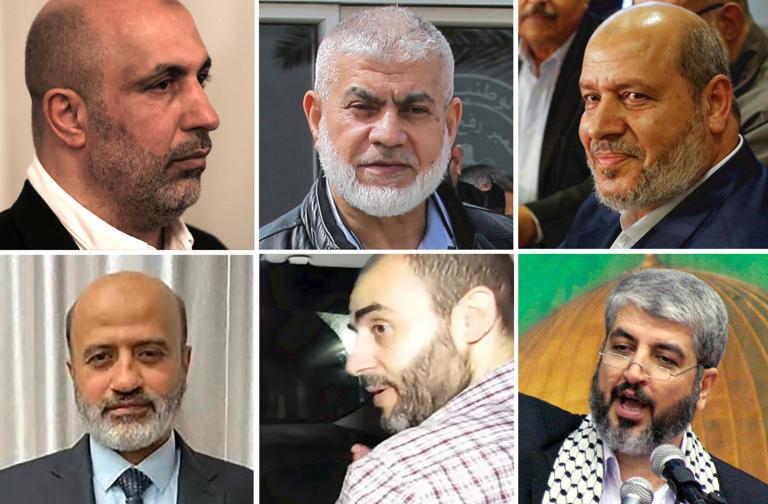
Who are the leaders running Hamas after Yahya Sinwar’s death?
Hamas is being run by a six-man leadership that brings together top officials in the occupied Palestinian territories and the diaspora. Khalil Al Hayya, a close aide of Yahya Sinwar, the group’s former leader who was killed by Israel in Gaza this month, has emerged as his probable successor, sources told The National on Wednesday.
They said the six-man leadership took over the militant group shortly after the killing of Mr Sinwar. Hamas has been run by a joint leadership before: the model was adopted for several years in Gaza in the 1990s when Sheikh Ahmed Yassin served as the group’s spiritual leader.
The members of the joint leadership, according to the sources, are Khaled Mashal, who was Hamas’s leader until 2017, Mr Al Hayaa, and Zaher Jabareen, the group’s intelligence and financial chief. All three are based in Qatar, and Mr Jabareen also spends time in Turkey.
Also included in the collective leadership are Mohammed Sinwar, the late Yahya Sinwar’s younger brother, and Rawhi Mushtaha, who Israel claims to have killed but who sources say is still alive. Both are veterans of Hamas’s military wing and are now “operational field commanders”, sources say. Muhammad Darwish, the powerful head of the group’s Shura Council, who resides in Turkey, is the sixth man in the group’s current leadership.
No overall leader for Hamas will be selected, the sources said, until elections are held early in 2025. However Mr Al Hayaa has already emerged as the most probable successor to Yahya Sinwar, they confirmed.
Mr Al Hayya, who is known to maintain close ties with both Iran and Egypt, was often Hamas’s chief representative in nearly a year of fruitless negotiations to reach a ceasefire in Gaza and secure the release of Israeli and other hostages held by Hamas since its fighters attacked southern Israel on October 7 last year.
Like Yahya Sinwar, Mr Al Hayya, 63, was jailed by Israel for three years in the early 1990s. He survived several assassination attempts which were blamed on Israel and in which nearly 30 of his family members, including two of his sons, were killed. He earned a doctorate in Islamic studies from a university in Sudan in 1997. A faithful disciple of Sheikh Yassin, Mr Al Hayya was one of the founders of Hamas in the 1980s.
“Hamas will continue to work towards the creation of a Palestinian state on Palestinian soil with Jerusalem as its capital,” he declared when announcing the death of Yahya Sinwar. The sources said the ascension of Mr Al Hayya to become leader of Hamas is far from a foregone conclusion, adding that Mr Mashal also has a good chance of taking the helm.
The choosing of a new leader comes at a critical time for Hamas. Israel’s Prime Minister Benjamin Netanyahu has declared the total annihilation of the group as being among the top goals of the Gaza war. The coastal enclave has been devastated by Israel’s military response to Hamas’s October 7 attack, with about 42,800 Palestinians dead according to the enclave’s Health Ministry, and more than twice that number wounded.
Large built-up areas of Gaza have been razed and the vast majority of the enclave’s 2.3 million residents displaced, multiple times in many cases. Hamas and UN officials maintain that continuing Israeli military operations in northern Gaza appear designed to lay waste to the region and depopulate it, as a prelude to the creation of a buffer zone there.
The sources said Hamas may have lost at least 30 per cent of its military-wing commanders during the war, and as much as 40 per cent of its storied network of underground tunnels. There have also been immense casualties among fighters on the ground, according to the sources, who gave no figures.
Israel claimed in February that it had killed 10,000 Hamas fighters in nearly four months of bombardment and ground operations. Hamas was believed to have up to 30,000 fighters on the eve of the war.
“There have been no significant replenishment of Hamas’s weapons and ammunition given that the war has been going on for more than a year,” said one of the sources. “It is obvious now that the way forward for Hamas will be high-profile attacks, suicide missions and an upsurge of attacks in the West Bank,” the source said.
“Netanyahu’s declared goals are unlikely to be achieved, but he is working very hard on the undeclared ones,” said prominent military analyst Samir Ragheb, a retired army general known to be close to the government. “These include making Gaza a place unfit to sustain communities, forced evictions, and shrinking the size of Gaza by creating militarised buffer zones.”
Source » msn.com





